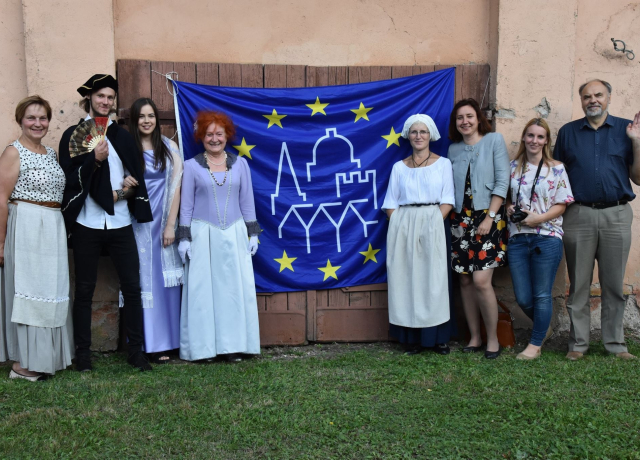European Heritage Days 2019: “Arts and Entertainment”
European Heritage Days 2019: “Arts and Entertainment”
The European Heritage Days, a joint initiative of the Council of Europe and the European Commission since 1999, are the most widely celebrated participatory cultural events shared by the inhabitants and visitors of Europe. The pan-European nature of this project contributes to bringing citizens together and highlighting the European dimension of cultural heritage in the 50 signatory States of the European Cultural Convention. Over 70 000 events are organised every year in order to help raise awareness of the value of this common heritage and the need for its conservation for present and future generations. In celebration of some of our oldest traditions, this year’s edition (#EHDs) will shine a spotlight on Europe’s rich “Arts and Entertainment” heritage.
An extensive and varied programme, taking place from August to October across the participating countries, will include festive events and festivals, exhibitions, craft workshops, conferences, tours, and many other activities. From street shows to concert halls, traditional theatres and museums to cinema and social media, the entertainment heritage of Europe will play out on local, national and European stages.
The aim of the European Heritage Days is to raise awareness of heritage, both tangible and intangible, which has helped to shape people's culture throughout history, thus promoting understanding of the past to better shape the future. Heritage is about objects and places, and the meanings and uses that people attach to them and the values they represent. The European Heritage Days develop and strengthen a feeling of belonging and of responsibility for heritage, underlining the relevance of human rights and democracy.
Events across the continent will give visitors the chance to try everything from making instruments out of vegetables in Postojna, Slovenia, to circus performances in the Nelosteatteri, revisiting a form of Finnish theatre that has been enjoyed for over a century.
Visitors in Ireland will dance their way along the road from Roscrea to Knock, enjoying what was once the most popular social event in Ireland, or those in England can revisit early modern Europe at a concert performed in period costume in Winchester, England.
A European cross-frontier initiative between the Republic of Moldova and Ukraine will take place thanks to close collaboration between the orchestra and soloists of the “Serghei Lunchevici” National Philharmonic in Chișinău and performers from the Opera and Ballet Theatre of Odessa.
St Patrick’s Cathedral in Dublin will host a sing-along of songs from popular children’s films, whilst visitors north of the border can discover their medieval roots by partaking in Historic European Martial Arts workshops in Newry.
And while Germany celebrates the 100th anniversary of the world-famous Bauhaus art school, vibrant jazz tunes in Rome will resonate the harmony created by diversity and the power of art to connect different cultures.
“The European Heritage Days, launched by the Council of Europe in 1985, are a concrete example of upholding the values of culture and heritage on our Continent, which are crucial if human rights and the rule of law are to flourish. They are an occasion to encourage public participation as an act of democratic citizenship, reinforcing a common shared identity at regional, national and European levels. The Council of Europe is dedicated to its commitment for a sustainable development that maintains and protects local heritage, enhances the environment and also associates young Europeans with conservation and restoration projects”, declared Gabriella Battaini-Dragoni, Deputy Secretary General of the Council of Europe.
“The European Heritage Days are a great opportunity for European citizens to connect with their cultural heritage. They are an important element of the European Framework for Action that I presented last December to ensure that the 2018 European Year of Cultural Heritage has an impact in the long term. As heritage is so fundamental to our societies and to linking our past with our future, it needs to have its place at the heart of citizens’ daily lives. The European Heritage Days have an important role in bringing it right there”, said Tibor Navracsics, European Commissioner for Education, Culture, Youth and Sport.
Background
Celebrated in 50 signatory States to the European Cultural Convention, European Heritage Days highlight the diversity of local skills, traditions, architectural styles and works of art that constitute shared European Heritage. Launched by the Council of Europe in 1985 in France, the Days have been organised as a joint initiative of the European Commission and the Council of Europe since 1999. Enabling citizens to explore a wide range of cultural assets through a number of themed events, European Heritage Days help uncover histories of people and places that have contributed to shape the culture and heritage of Europe.
The aim is to increase understanding of a shared European past, encourage appreciation of traditional values and inspire new heritage conservation and education practices. Cultural heritage has always been recognised as a priority by the Council of Europe. Moreover, it is now a pivotal theme under Creative Europe, the EU's programme for the cultural and creative sectors.
More information
European Heritage Days Portal: www.europeanheritagedays.com
Council of Europe: European Heritage Days
European Commission: European Heritage Days
Facebook: www.facebook.com/EHDays
Twitter: @JEP_EHD #EHDs
Instagram: @europeanheritagedays #EHDs #JEP
